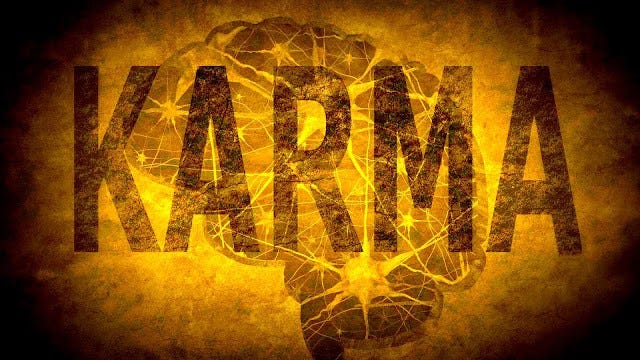Understanding Karmic Relationships: A Deep Dive into Karma
Written on
Chapter 1: The Essence of Karma
In the Western world, the concept of karma is often misunderstood, particularly in the context of its original meanings rooted in Hinduism and Buddhism. This topic is frequently discussed yet remains shrouded in ambiguity. Here, karma is commonly perceived as a simple cause-and-effect principle: those who act with ill intent are met with misfortune, while those who do good receive blessings. We often find ourselves saying things like, “They will get their karma,” or using phrases like “karma is a b***h,” to express our feelings of justice. This interpretation, however, is a significant oversimplification of karma's true nature, especially when viewed through the lens of Eastern philosophies. This treatise will delve into the complexities of karma, particularly focusing on karmic bonds and relationships.
To truly grasp the concept of karma, we must acknowledge its inseparable link to past lives and reincarnation. These ideas are intertwined with fate, and it's important to recognize that discussions of karma cannot proceed without considering these aspects. In Eastern thought, karma is often viewed through a more positive lens, as a vibrant essence that persists from one life to the next, much like an aura that surrounds us. Our actions in this life accumulate karma, which then shapes our destinies in future incarnations.
Consider someone experiencing great hardship who might think, “I must have done something terrible in a past life to deserve this.” This sentiment captures a fragment of what karma entails. Our fate is intricately tied to our karmic actions. A compelling illustration of karma, particularly regarding karmic relationships, can be found in the young adult novel Holes. In this story, a historical injustice committed by one individual is ultimately rectified by their distant descendants, Stanley Yelnats and Hector Zeroni, highlighting the notion of karmic retribution that transcends generations.
Another powerful representation of karma appears in Stephen King's The Dark Tower series, where the concept of "ka" symbolizes a person's destiny, shaped by accumulated karma. The idea of "ka-tet" refers to a group or couple bound by shared karma, emphasizing the importance of relationships in understanding karma's true essence. As we move forward in this discussion, we will explore the significance of these bonds.
Karma is a conversation primarily for those we label as "old souls." In both Hindu and Buddhist traditions, individuals often dedicate their lives to preparing for what lies beyond, including the next reincarnation. This idea resonates within many spiritual communities today. In Buddhism, for example, it is believed that individuals must address their karmic debts in this lifetime to achieve enlightenment or ascend like revered figures such as Buddha. This belief is echoed in new age spiritualism, which posits that we are transitioning from a three-dimensional to a five-dimensional consciousness, a process called ascension. Reincarnation is central to this belief, suggesting that without resolving karmic ties, individuals cannot attain this higher state of being.
While extensive literature exists on karmic relationships, many sources approach the topic with a somewhat negative perspective. A significant number of articles focus on identifying signs of a karmic bond, often emphasizing the tumultuous and charged nature of these relationships. They frequently describe these connections as intense, marked by dramatic highs and lows, and caution against conflating them with soulmates or twin flames. This perspective is intriguing, particularly given the profound role karmic relationships can play in our spiritual development. Why would one wish to sever ties with an opportunity for spiritual growth? While individuals can choose to break free from karmic bonds, doing so should be approached with care and consideration of the lessons at stake.
The key takeaway is that karmic relationships are vital to our lives, both now and in the future. These connections are intense and intimate, designed to impart crucial life lessons. They are typically transient, meant to exist for a limited time. Given the significance of these relationships in shaping our destinies, it's essential to reflect on the lessons learned from each encounter. As these relationships may inevitably come to an end, it is wise not to rush the process of resolving karmic ties. Take the necessary time to address your karmic debts and embrace the opportunity for spiritual growth. Resist the urge to seek an immediate escape from the relationship; instead, consider leaving only after you believe you have fully absorbed the lessons it has to offer.
As I conclude this exploration, I appreciate your time and engagement with this subject. If you found this discussion insightful, I encourage you to join the conversation by sharing your thoughts in the comments or connecting with me on my page.
Section 1.1: Karmic Relationships Explored
Karmic relationships are often misconstrued, but they serve a vital purpose in our lives. They are not merely obstacles to overcome but rather opportunities for profound personal transformation.

Section 1.2: The Role of Reincarnation in Karma
Understanding karma requires recognizing its connection to reincarnation and fate, which enriches our comprehension of life's lessons.
Chapter 2: Insights from Karmic Relationships
The first video, "What is a Karmic Relationship and Why is it Hard?" by Sonia Choquette, offers a detailed analysis of the complexities involved in karmic relationships and why they can be challenging.
The second video, "How to Bring Closure to Karmic Relationships" by Sonia Choquette, provides guidance on how to find resolution within these intense connections and move forward positively.